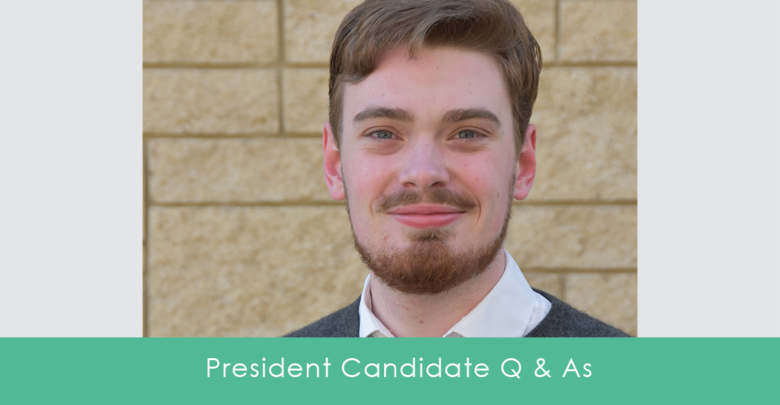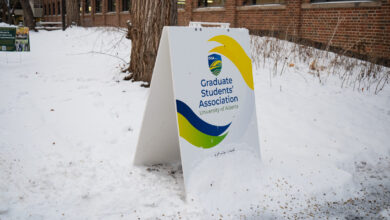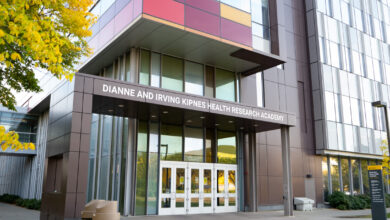SU Elections 2021 Q&A: President
Meet the lone candidate hoping to be your next Students' Union president
 Pia Co
Pia CoThe president is the chief representative of the Students’ Union and the 30,000 undergraduate students attending the University of Alberta. They oversee the rest of the Students’ Union executives, the organization’s operations, and sit on a number of university governance bodies including the Board of Governors and General Faculties Council.
This year there is only one candidate hoping to head the Students’ Union: Rowan Ley, a fifth-year history student and current Students’ Union vice-president (external).
Follow this link to see Ley’s candidate pitch video.
The following interviews have been condensed and simplified for clarity.
In one minute or less, can you tell us why you are running for the position of Students’ Union President?
Rowan Ley: I’m running because this is my fifth year on campus now and I have honestly had a lot of amazing experiences at U of A, but this community does leave a lot to be desired.
It has also given me a lot and I want to take this opportunity in my last year to give back. I want to help deal with some of the biggest issues on our campus, that in my previous roles as Students’ Union vice-president (external) and Board of Governor’s representative, I didn’t have the opportunity to address. Specifically, I want to do something about the terrible lack of accessible and affordable childcare on campus, about our antiquated grading system which doesn’t compare well to other major Canadian universities. I want to work on the issues of lack of access to counselling, but also the root causes of mental health issues which have been a problem for as long as I’ve been here at university. Also, this year we have the new and unique issue of what I think we can only call the failure of online delivery that needs to be urgently addressed and I want to help resolve that issue too.
Can you briefly and concisely describe your platform?
My platform is broken down into eight major points. First of all, I have a compassionate grading policy where I advocate for the adoption of a policy that already exists at the University of British Colombia, York, University of Toronto, and McGill, which is an opt-in pass-fail system for a limited number of courses in your degree. This encourages students to take courses outside their comfort zone and make sure that in a mental health crisis, you’re not forced to drop a course or fix a lower GPA. That’s an option that already exists in other major universities and I think it’s realistic to have it here.
I’m advocating for the abolition of the instalment fee and the lowering of the Student Academic Support fee for students on practicum because I think the worst fees we pay are the ones where you literally don’t get anything for it. I am promising to create a working group to look into how we can provide accessible daycare on campus, and I would hope to be able to have a new daycare facility open on campus by 2023. This should be feasible as there are lots of other universities and student associations that do it. For example, the University of Winnipeg is one of the best examples and they’re smaller than we are.
I want to continue work that’s been done to make sure that culturally and trauma-informed supports are available on campus for mental health services and find free and sustainable funding for the free menstrual products initiative. I want to continue the work I did this year organizing meaningful student opposition to massive cuts to the U of A. I also want to continue the fight to make sure online proctoring is severely restricted and finish the Council of Alberta University Students’ (CAUS) Indigenous Undergraduate Research Project which I’ve started and is nearly done.
I want to finish the Canadian Alliance of Student Associations (CASA) access to Francophone education policy which I’ve been working on this year and continue the work being done by past student leaders to get a Study-to-Stay Visa Nomination program for international students from the provincial government, like the one that exists in Manitoba, Ontario, and the maritimes.
This year there has been a lot of controversy around academic restructuring and the decisions made by the university adminstration. Specifically, there have been concerns that the student voice was not heard during the consultation process. How will you ensure that the student concerns will be heard and addressed as the university begins restructuring?
Well, the most important thing is to have independent numbers and independent data, rather than simply taking the numbers collected by the university and assuming that they’re correct and free of bias. The Students’ Union has a pretty impressive capacity to survey and collect experiences from students. The most important thing we need to do is collect independent data and stories to see how academic restructuring is going and evaluate the impact it’s having on the student experience, which we can then use to advocate for change in the process. I plan to use our SU Perks survey collection system and annual surveys to check in on the progress of academic restructuring, see how it’s impacting students, and then develop options to move forward from there.
As classes moved online, many students have complained about not being properly supported by their professors and university. This issue especially involved international and marginalized students. The university has currently created a Task Force on Remote Teaching and Learning, but how will you ensure that these concerns are effectively addressed?
This is one of those situations where what we need, most of all, is excellent follow-through on the work that’s already been done this year. Current vice-president (academic) David Draper has done a great job at bringing this issue to the attention of the administration and getting the ball rolling, but we need to finish getting the ball to the top of the hill. We are going to need pretty rigorous oversight and engagement with the Task Force on Remote Teaching and Learning to make sure they do not try to get away with half measures, and that there is actually significant and meaningful change. If we do not see that significant and meaningful change, then we’ve already demonstrated at the last meeting of General Faculties Council (GFC) that we have the ability to force the university to pay attention and to make our voice heard in a loud and unignorable way. If we do not get meaningful change out of this working group, we are going to have to take that to the next level.
Collegial governance at the University has been heavily discussed by students, administrators, and faculty. What does collegial governance look like to you and why is it important for students?
One of the most important things about collegial governance is that it is a system in which students have a say and have a vote. People don’t realize this, but GFC actually gives about a third of the votes on that body to students. That’s not just consultation— that’s real power if we use it well. To me, the most important thing about collegial governance is that, in Alberta, it’s a system where we as students actually get a voice in how our tuition money is spent and where our university as an institution goes.
The voice of students and governance has been under attack in the past. There are folks in the campus community who do not think that students should have that front and centre seat in governance and that decisions should be left to others while we should just be consulted. I believe that that’s deeply wrong, and would be very harmful to our ability to advocate for students. So, continuing to advocate for student representation, and meaningful representation, where we actually get votes on the issues that matter, is what collegial governance means to me and why it matters so much to students.
The International Students Association (ISA) became a Student Representative Association (SRA) this year. How will you continue to support the ISA and ensure international students are represented?
One of the most important things we can help the ISA with is getting office space on campus. This has not been so topical or practical this year because of COVID-19, but in future having that on-campus home is essential. We also need to continue building a healthy and positive relationship with the ISA leadership, so we can work together on the basis of trust and collaboration. Building that relationship will be one of my biggest priorities, and it’ll start by having a lot of conversations with the new ISA executives, identifying our shared priorities, and identifying ways that we can actually collaborate on advocacy on those priorities. I want to identify ways that we can work together as partners.
This is a really tough time for students and there are many issues to address. What will be your number one priority as Students’ Union President?
It’s difficult to make anything number one, but I do have to say that my biggest priority will be addressing our outdated grading system. I think that a lot of mental health problems on campus, while they can be addressed through more access to counselling services, are best addressed at the root cause. The root cause is our immensely stressful, outdated, and overly simplistic grading system. Bringing in an opt-in pass-fail policy would be a massive win for students that would make a big difference financially and to mental health. It will also allow us to explore our passions a little more. That will be my highest priority, but you know it’s not a step above the others. It’s the first among equals.
Fun question: If you had to eat from one campus restaurant for the rest of your life, what would it be and why?
Filistix definitely. I already have what I call Filistix Fridays. I have built up a pretty outrageous number of points there. That being said, I love all of our restaurants at SUB, and it would be a very painful choice for me, but I think Filistix offers value in the portions to keep a larger guy like me satisfied.




